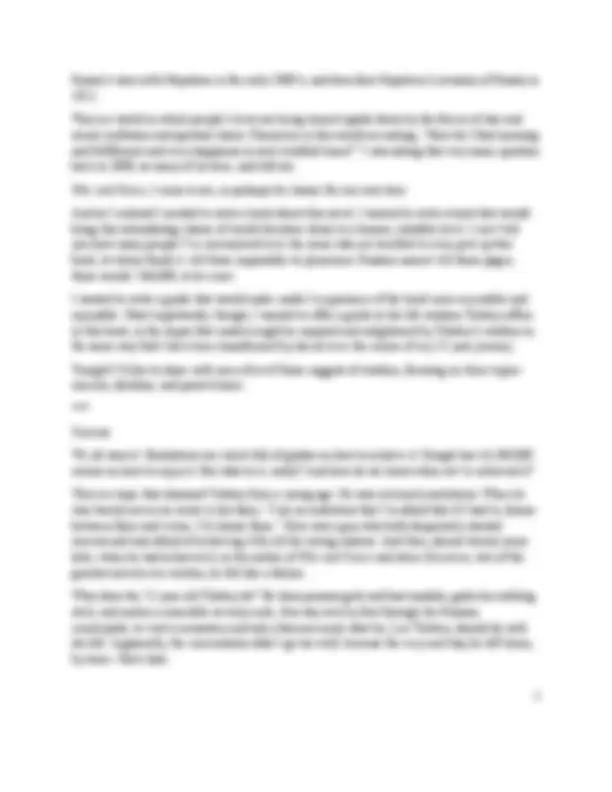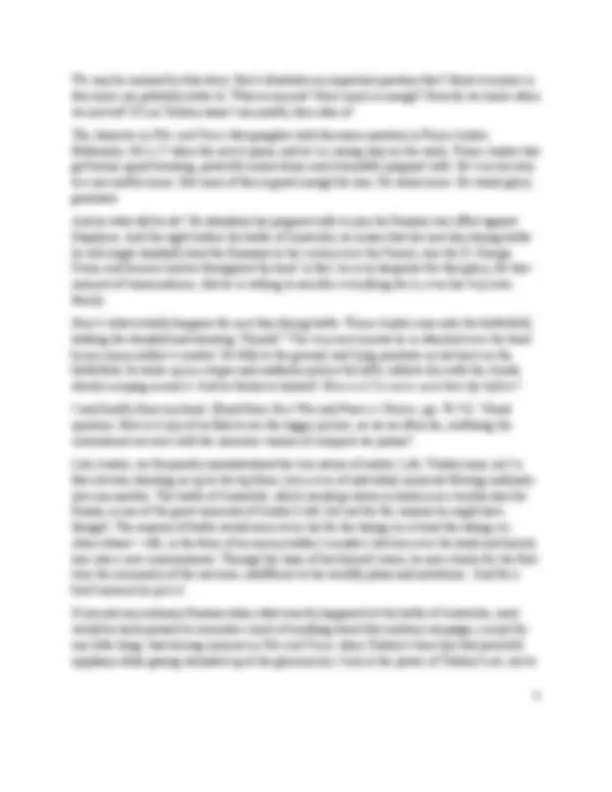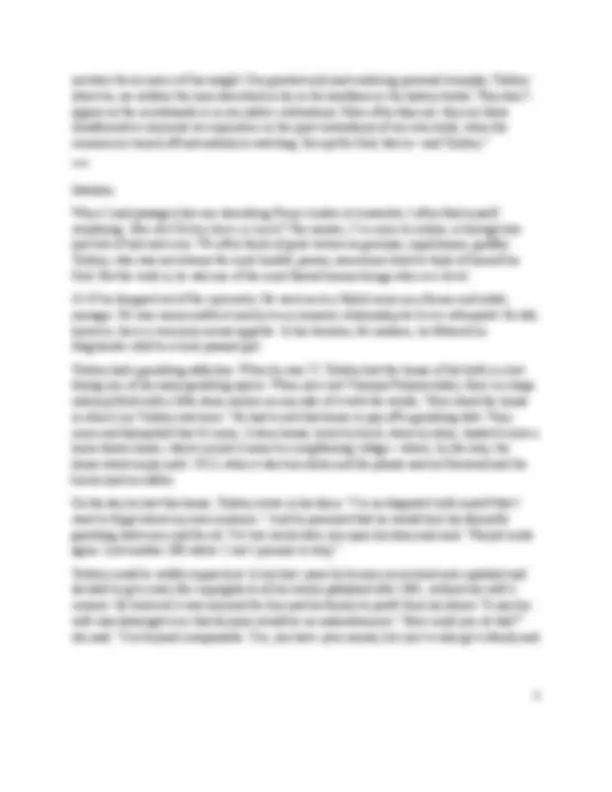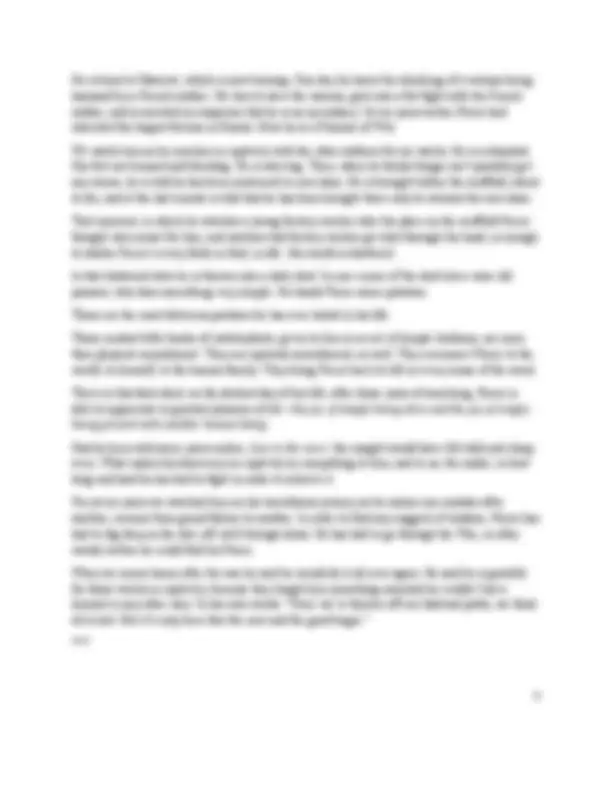







Study with the several resources on Docsity

Earn points by helping other students or get them with a premium plan


Prepare for your exams
Study with the several resources on Docsity

Earn points to download
Earn points by helping other students or get them with a premium plan
Community
Ask the community for help and clear up your study doubts
Discover the best universities in your country according to Docsity users
Free resources
Download our free guides on studying techniques, anxiety management strategies, and thesis advice from Docsity tutors
In this Hackley Distinguished Lecture, the speaker shares their personal journey with Leo Tolstoy's 'War and Peace' and the life lessons they've gleaned from the novel. From the speaker's first encounter with the book as a college student to teaching it in a prison workshop, they explore the capacity of Tolstoy's art to engage readers in meaningful conversations about the human condition.
What you will learn
Typology: Schemes and Mind Maps
1 / 9

This page cannot be seen from the preview
Don't miss anything!






Hackley Distinguished Lecture: Give War and Peace a Chance: Tolstoyan Wisdom for Troubled Times
I am honored to be here tonight. I would like to thank Kathleen Snider and the Friends of the Hackley Library for this honor. I thank John Snider, who chaired the nominating committee and Marty Ferriby, who extended the invitation. Thank you to Pat and Paul Ladas for co-chairing this special event. And thank you, my fellow Muskegonites, for welcoming me in warm, West Michigan fashion back to the place where it all began.
Tonight is a homecoming for me in every sense of the word. My lifelong journey as a public humanities teacher began right next door, at Hackley Library, where during my summer vacations from college I led book discussions on Russian literature. Nearly all the participants were between two and four times older than me. I am grateful to this day that they indulged their highly inexperienced yet enthusiastic teacher, as that was my first taste of the joys of teaching Russian literature and discussing it in a community context.
Tonight I’d like to share with you a little bit about where that journey has taken me for the past 30 years or so since I left Muskegon, by focusing on one centerpiece of that journey: a “little” book most of you have heard of, a book called War and Peace. [Show my copy of War and Peace .] This is my actual copy of War and Peace —and the full extent of the multi-media portion of tonight’s presentation.
You may be having a moment of déjà vu. You might be trying to remember where you may have seen this book before. [Hold up my book Give War and Peace a Chance .] You may have seen it on the cover of my book Give War and Peace a Chance. On the cover of my book is a picture of my very own copy of War and Peace!
As you can see, this is a well-loved book. This is a book that has not stayed on a library shelf. It’s a book that has been lived with, engaged with, tossed around a bit in every sense. I sometimes bring this book to class show to my students. I tell them that this is what it looks like to read the hell out of a book, to have a relationship with a book.
Relationship is not too strong of a word to describe my journey with Tolstoy. We’ve been together now for almost 30 years. It’s been one of the longest relationships of my life, not to mention one of the most intense. My wife, who is here tonight, will attest to that. She has suffered through countless dinner conversations with Tolstoy and me. She has watched me with some concern on more than one occasion as I lovingly caress the tattered pages of this old copy of War and Peace ….
We’ve had our ups and our downs...Tolstoy and I, that is. We’ve had our disagreements, our separations. I even went through what I thought was a divorce, when after graduate school I refused to read a word of Tolstoy for a few years.
But as with any good relationship that lasts for a long time, every couple of years or so I rediscover the reasons I fell in love in the first place.
One of those moments happened for me in 2009 when I was invited to teach a workshop in a prison about Tolstoy’s short novella, The Death of Ivan Ilyich. It’s a story of a middle-aged guy who contracts a fatal illness and has to come to terms with how he’s lived his life.
I’d never been to a prison before and still remember the moment I walked into that prison classroom, dressed in a suit and tie and noticing fifteen pair of male eyes staring at me from above identical orange jumpsuits. In that moment I knew that what I had prepared wasn’t going to work. So I dropped my planned notes, sat down in a circle with these guys, who had read the novella in advance. And I asked them a simple question: “What did reading this story mean to you ?”
That simple question led to one of the most powerful classroom discussions of my life up to that point. These men opened up about experiences they’d had with death, people they’d watched die. They talked about decisions they made in their lives, opportunities they squandered, or perhaps never had.
All of a sudden a conversation about Russian literature became a conversation about real life. I realized in that moment what it is that I had always loved about Russian literature, about Tolstoy in particular. It is the capacity of his art to engage readers from incredibly wide backgrounds in meaningful, authentic conversation about things that matter to all of us as human beings—about what the Russians call the “accursed” questions: Who am I? Why am I here? How should I live?
This is what I have always loved about War and Peace , as well. It’s a book I’ve read about 15 times. Every time I do so it becomes a new book, comes alive for me in new ways. It changes and grows as I change and grow, which is exactly what classic work of literature can do.
In 2008 War and Peace became a whole new book for me again. The so-called financial crisis hit home for me in a deeply personal way as I was experiencing financial pressures I’d never known before. It felt as if the bottom had dropped out, as if some of my most basic assumptions about the world and my place in it were no longer valid. I realized, literally overnight, that my happiness and security are gifts that can be shattered just like that—in an instant.
I happened to be reading War and Peace at the time, because I was then finishing my first book about Tolstoy. I saw something in this novel I’d never noticed before in my previous readings. I saw that this is a book about a society going through a time of crisis. It takes place during
We may be amused by this story. But it illustrates an important question that I think everyone in this room can probably relate to. What is success? How much is enough? How do we know when we arrived? If Leo Tolstoy wasn’t successful, then who is?
The character in War and Peace that grapples with this same question is Prince Andrei Bolkonsky. He’s 27 when the novel opens, and he’s a young man on the make. Prince Andrei has got brains, good breeding, powerful connections, and a beautiful pregnant wife. He’s on his way to a successful career. But none of this is good enough for him. He wants more. He wants glory, greatness.
And so what did he do? He abandons his pregnant wife to join the Russian war effort against Napoleon. And the night before the battle of Austerlitz, he muses that the next day during battle he will single-handedly lead the Russians to the victory over the French, win the St. George Cross, and become known throughout the land. In fact, he is so desperate for that glory, for that moment of transcendence, that he is willing to sacrifice everything for it, even his very own family.
Here’s what actually happens the next day during battle: Prince Andrei runs onto the battlefield, holding the standard and shouting “Hurrah!” The very next minute he is whacked over the head by an enemy soldier’s musket. He falls to the ground, and lying prostrate on his back on the battlefield, he looks up in a stupor and suddenly notices the lofty, infinite sky with the clouds slowly creeping across it. And he thinks to himself: How is it I’ve never seen that sky before?
I read briefly from my book. [Read from Give War and Peace a Chance , pp. 70-71]: “Good question. How is it any of us fails to see the bigger picture, as we so often do, confusing the contentment we seek with the narrower visions of conquest we pursue?
Like Andrei, we frequently misunderstand the true nature of reality. Life, Tolstoy says, isn’t a fast elevator shooting us up to the top floor, but a river of individual moments flowing endlessly into one another. The battle of Austerlitz, which would go down in history as a terrible loss for Russia, is one of the great moments of Andrei’s life; but not for the reasons he might have thought. The majesty of battle would seem to be his for the taking (or at least the taking in ), when wham!—life, in the form of an enemy soldier’s musket, hits him over the head and knocks him into a new consciousness. Through the haze of his blurred vision, he sees clearly for the first time the immensity of the universe, indifferent to his worldly plans and ambitions. And for a brief moment he gets it.
If you ask any ordinary Russian today what exactly happened at the battle of Austerlitz, most would be hard-pressed to remember much of anything about that military campaign, except for one little thing: that stirring moment in War and Peace when Tolstoy’s hero has that powerful epiphany while gazing wounded up at the glorious sky. Such is the power of Tolstoy’s art, not to
mention the accuracy of his insight. Our greatest and most enduring personal triumphs, Tolstoy observes, are seldom the ones described in the in the headlines or the history books. They don’t appear on the scoreboards or in our public celebrations. More often than not, they are those transformative moments we experience in the quiet inwardness of our own souls, when the cameras are turned off and nobody is watching. Except for God, that is—and Tolstoy.”
Idealism.
When I read passages like one describing Prince Andrei at Austerlitz, I often find myself wondering: How did Tolstoy know so much? The answer, I’ve come to realize, is through lots and lots of trial and error. We often think of great writers as geniuses, superhuman, godlike. Tolstoy, who was not always the most humble person, sometimes liked to think of himself as God. But the truth is, he was one of the most flawed human beings who ever lived.
At 19 he dropped out of the university. He went on to a failed career as a farmer and estate manager. He was unsuccessful at nearly every romantic relationship he’d ever attempted. He did, however, have a voracious sexual appetite. In his twenties, for instance, he fathered an illegitimate child to a local peasant girl.
Tolstoy had a gambling addiction. When he was 27, Tolstoy lost the house of his birth in a bet during one of his many gambling sprees. When you visit Yasnaya Polyana today, there is a large unkempt field with a little stone marker on one side of it with the words, “Here stood the house in which Leo Tolstoy was born.” He had to sell that house to pay off a gambling debt. They came and dismantled that 42-room, 3-story house, brick by brick, stone by stone, loaded it onto a horse drawn trailer, which carried it away to a neighboring village—where, by the way, the house stood empty until 1913, when it was torn down and the planks used as firewood and the bricks used as rubble.
On the day he lost this house, Tolstoy wrote in his diary: “I’m so disgusted with myself that I want to forget about my own existence.” And he promised that he would kick his shameful gambling habit once and for all. Yet two weeks later you open his diary and read: “Played cards again. Lost another 200 rubles. I can’t promise to stop.”
Tolstoy could be wildly impractical. In his later years he became an avowed anti-capitalist and decided to give away the copyrights to all his works published after 1881, without his wife’s consent. He believed it was immoral for him and his family to profit from his labors. To say his wife was distraught over that decision would be an understatement. “How could you do that?” she said. “It is beyond irresponsible. Yes, you have your morals, but you’ve also got a family and
shaped his thinking about nonviolent resistance. Martin Luther King was inspired by Tolstoy. And Nelson Mandela was given a copy of War and Peace to read while incarcerated as a young man at Robben Island. In his biography, Long Walk to Freedom , Mandela called War and Peace his favorite work of fiction. He said it was a work that inspired and consoled him during one of his life’s darkest hours.
War and Peace has also resonated powerfully with inmates. In January I had the opportunity to visit the Oregon State Penitentiary, where inmates in a maximum security prison were reading the novel as part of a class. I had the opportunity to lead a discussion, during which one of the inmates described one of the key messages he took from Tolstoy’s novel. “If I didn’t believe I could change, others could change, even in this place,” he said, “my life wouldn’t be worth living.”
Yet he said that Tolstoy reminded him that it was worth living, even though that life would be spent behind bars.
Tolstoy believed that life is always worth living, no matter what circumstances we may find ourselves in, no matter how difficult it may sometimes seem.
Perseverance.
In Russian the word for “peace” in the title War and Peace also means “world,” “cosmos.” So when a Russian hears the title War and Peace , they’re also hearing subconsciously War and the World. Tolstoy is playing on the idea, so central to his book, that life is often about struggle, hardship, and battle.
If we as individuals are going to find our happiness—our peace, if you will—we’re not going to find it out there, in some abstract notion of glory or greatness. We’re not going to find it in some idea of a final destination we’re supposed to reach, or in an ideal of perfection we’re supposed to embody. We’re only going to find our happiness right down here, in the rough and tumble of our everyday lives, and within our own imperfect selves. And it may well take a lot of struggle to get there.
Nobody learns this lesson more poignantly than Pierre Bezukhov, the great friend of Prince Andrei and perhaps my favorite character in the novel. When the book opens, he has just inherited the largest fortune in Russia. He winds up in a disastrous marriage to the fortune-hunting Helene Kuragin. He gets divorced. He falls in love again, and out of love. He becomes a Freemason, thinks he is going to free his peasants. That goes nowhere. When the French invade Russia in 1812, he wants to check out the battlefield. There he is, in his green tailcoat and white summer hat, bouncing about the battlefield with bullets flying all around him.
He returns to Moscow, which is now burning. One day he hears the shrieking of a woman being harassed by a French soldier. He tries to save the woman, gets into a fist fight with the French soldier, and is arrested on suspicion that he is an incendiary. Seven years earlier Pierre had inherited the largest fortune in Russia. Now he is a Prisoner of War.
We watch him as he marches in captivity with the other soldiers for six weeks. He is exhausted. His feet are bruised and bleeding. He is starving. Then, when he thinks things can’t possibly get any worse, he is told he has been sentenced to execution. He is brought before the scaffold, about to die, and at the last minute is told that he has been brought there only to witness the execution.
That moment, in which he watches a young factory worker take the place on the scaffold Pierre thought was meant for him, and watches that factory worker get shot through the head, is enough to shatter Pierre’s every faith in God, in life. His world is shattered.
In that shattered state he is thrown into a dark shed. In one corner of the shed sits a wise old peasant, who does something very simple. He hands Pierre some potatoes.
Those are the most delicious potatoes he has ever tasted in his life.
Those modest little hunks of carbohydrate, given to him in an act of simple kindness, are more than physical nourishment. They are spiritual nourishment, as well. They reconnect Pierre to the world, to himself, to the human family. They bring Pierre back to life in every sense of the word.
There in that dark shed, on the darkest day of his life, after those years of searching, Pierre is able to appreciate to greatest pleasure of all— the joy of simply being alive and the joy of simply being present with another human being.
Had he been told some years earlier, Live in the now!, the insight would have felt dull and cheap even. What makes his discovery in captivity so compelling to him, and to us, the reader, is how long and hard he has had to fight in order to achieve it.
For seven years we watched him on his tumultuous journey as he makes one mistake after another, careens from grand failure to another. In order to find any nuggets of wisdom, Pierre has had to dig deep in the dirt, sift well through dross. He has had to go through the War, in other words, before he could find his Peace.
When he comes home after the war he said he would do it all over again. He said he is grateful for those weeks in captivity, because they taught him something essential he couldn’t have learned in any other way. In his own words: “Once we’re thrown off our habitual paths, we think all is lost. But it’s only here that the new and the good begin.”